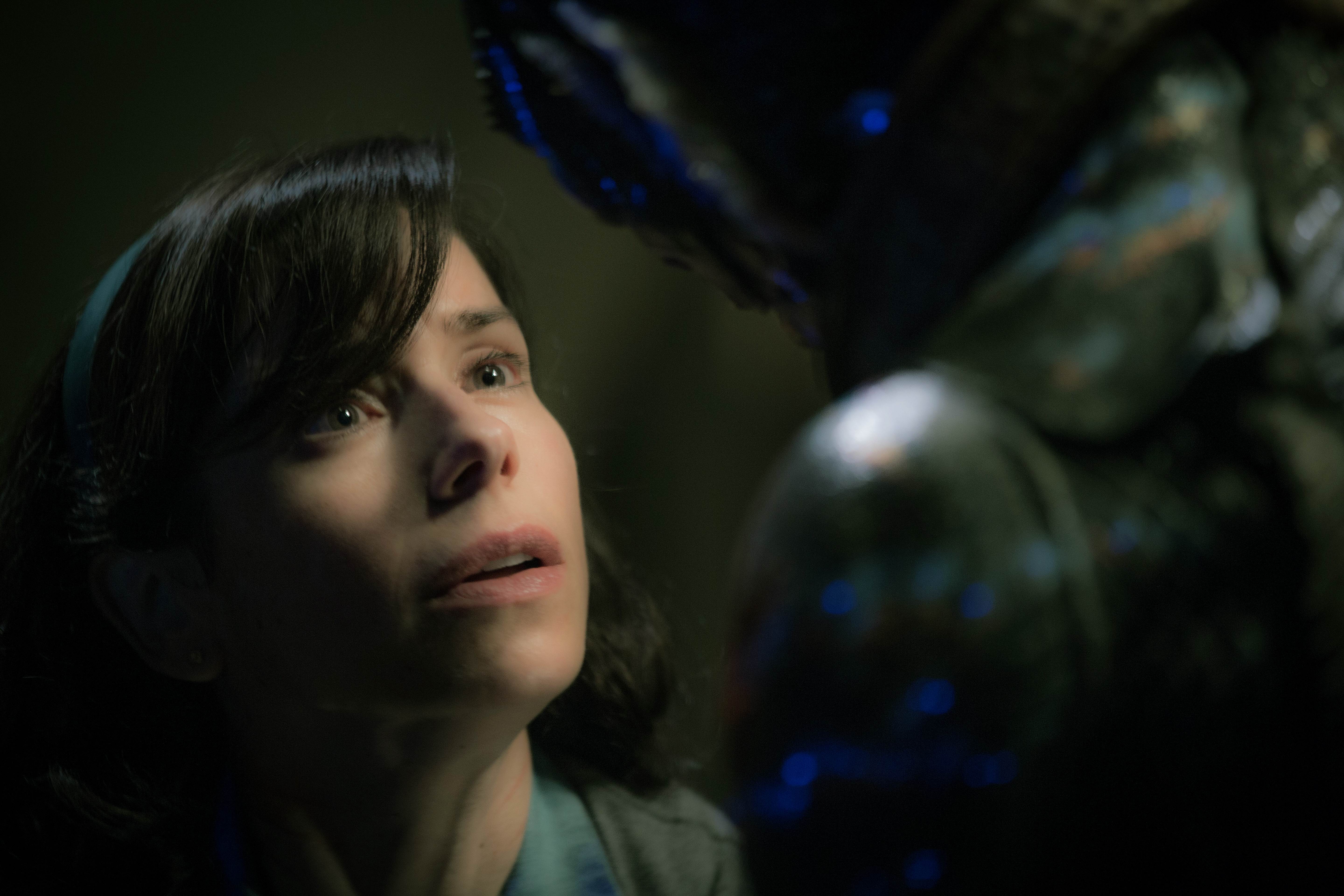Guillermo del Toro is not profound
Everyone thinks his adult fantasies are deep. Everyone is wrong.


A free daily email with the biggest news stories of the day – and the best features from TheWeek.com
You are now subscribed
Your newsletter sign-up was successful
Guillermo del Toro's The Shape of Water is unmistakably a fable. It takes place in a stylized, green-tinted version of the Cold War past; its internal logic is vaguely dreamlike rather than strictly realistic; and, perhaps most important, it's a beauty-and-the-beast love story between a shy woman and a majestic humanoid sea creature. But like most of del Toro's films, Water is hardly intended for the typical fairy-tale audience. It's rated R, and even before it indulges in some gruesome violence, it shows the heroine masturbating as part of her daily routine.
That Elisa (Sally Hawkins) is allowed to express sexuality in the movie sets it apart from so many homage-heavy, movie-drunk tributes to monsters and Old Hollywood. Del Toro clearly has designs on an adult sensibility; his previous picture, Crimson Peak, was also rated R, as was his acclaimed kid-starring fantasy Pan's Labyrinth and his comic-book franchise entry Blade II. He's made movies appropriate for 13-year-olds (see the robots-versus-monsters epic Pacific Rim), but unlike so many Hollywood fantasists, he doesn't chase that demographic. He's chasing his muse, and trying to infuse it with the poetry he sees in his influences.
Yet there's still something unsophisticated about The Shape of Water — a limitation that's faintly visible in some of del Toro's past movies but more glaring when he tries to make his monsters meaningful. It goes beyond the screenplay's oddball contrivances, like the way mute-from-birth Elisa works a second shift at a shadowy government facility where she's allowed to scrub floors in a top-secret lab more or less unsupervised, or the way scientists and spooks dither over the fate of the amphibious man (Doug Jones) long enough to give Elisa a chance to plan his escape. These details, as mentioned, can be chalked up to a low-key dream logic, though they lack the wit of, say, Tim Burton at his best.
The Week
Escape your echo chamber. Get the facts behind the news, plus analysis from multiple perspectives.

Sign up for The Week's Free Newsletters
From our morning news briefing to a weekly Good News Newsletter, get the best of The Week delivered directly to your inbox.
From our morning news briefing to a weekly Good News Newsletter, get the best of The Week delivered directly to your inbox.
Where The Shape of Water falls shortest is in the unconvincing adult relationship between woman and amphibi-man. Elisa's initial bond with the creature — feeding him hard-boiled eggs, showing him what music is — more closely resembles a parent-child tutelage, and much of it is delivered in montage featuring, well, more egg-eating and music-playing. The movie is full of swoony romantic images. It's odd, then, that many of the best ones don't involve the creature himself but rather Elisa's quiet fascination with older musicals (she practices tap dancing down the greenish halls of her apartment building). Her two interests — lush musicals and her creature pal — intersect for a fantasy sequence, but as gorgeous as it is, it never takes on weight greater than a whimsical daydream.
Hawkins and Jones both give expressive physical performances, but del Toro simply doesn't give them much to express below those physical surfaces. Elisa is meant to recognize the loneliness of this poor creature as similar to herself: "I move my mouth, like him," she signs to her friend Giles (Richard Jenkins). "I make no sound, like him." She further explains that the creature accepts her, and doesn't think of her as "incomplete" without her voice. But del Toro isn't particularly skilled at conveying Elisa's supposed loneliness; she's close with Giles, and with her coworker Zelda (Octavia Spencer), and both of them understand her perfectly. She's "lonely" because the movie needs her to be lonely.
Del Toro's reconception of a Black Lagoon-like creature as a romantic hero is an irresistible notion. But it's so much more concept than it is actual romance; as with the escape plan, Elisa (which is to say Hawkins) does most of the work. There are some nicely gruesome moments where del Toro pokes at the romanticizing of what is, after all, an untamed creature, no matter how advanced. Later, he subjects some of that danger to supernatural cop-outs, and his sense of irony, conveyed through hamfisted depictions of bigotry, is thin. Why, could it be that the "monster" the opening narration refers to may not actually be the amphibian man, but the cruel, racist security agent Strickland (Michael Shannon, creeping everyone out with his usual vim and vigor)?
The Shape of Water is beautifully crafted on a technical level, just like del Toro's other films, but it's no more communicative than Pacific Rim. And like Crimson Peak, it renders the idea of romantic melodrama oddly abstract. If another filmmaker, earlier in his career, made something so gorgeous, idiosyncratic, and emotionally inert, I might say he was just struggling to translate the soul of his obsessions to the screen. At this point, though, it seems like Shape is exactly what del Toro had in his head.
A free daily email with the biggest news stories of the day – and the best features from TheWeek.com
Maybe, most of the time, he's not struggling to dive below the surface. Maybe this is as much depth as he can plumb.
Jesse Hassenger's film and culture criticism has appeared in The Onion's A.V. Club, Brooklyn Magazine, and Men's Journal online, among others. He lives in Brooklyn, where he also writes fiction, edits textbooks, and helps run SportsAlcohol.com, a pop culture blog and podcast.
-
 What are the best investments for beginners?
What are the best investments for beginners?The Explainer Stocks and ETFs and bonds, oh my
-
 What to know before filing your own taxes for the first time
What to know before filing your own taxes for the first timethe explainer Tackle this financial milestone with confidence
-
 The biggest box office flops of the 21st century
The biggest box office flops of the 21st centuryin depth Unnecessary remakes and turgid, expensive CGI-fests highlight this list of these most notorious box-office losers
-
 Walter Isaacson's 'Elon Musk' can 'scarcely contain its subject'
Walter Isaacson's 'Elon Musk' can 'scarcely contain its subject'The latest biography on the elusive tech mogul is causing a stir among critics
-
 Welcome to the new TheWeek.com!
Welcome to the new TheWeek.com!The Explainer Please allow us to reintroduce ourselves
-
 The Oscars finale was a heartless disaster
The Oscars finale was a heartless disasterThe Explainer A calculated attempt at emotional manipulation goes very wrong
-
 Most awkward awards show ever?
Most awkward awards show ever?The Explainer The best, worst, and most shocking moments from a chaotic Golden Globes
-
 The possible silver lining to the Warner Bros. deal
The possible silver lining to the Warner Bros. dealThe Explainer Could what's terrible for theaters be good for creators?
-
 Jeffrey Wright is the new 'narrator voice'
Jeffrey Wright is the new 'narrator voice'The Explainer Move over, Sam Elliott and Morgan Freeman
-
 This week's literary events are the biggest award shows of 2020
This week's literary events are the biggest award shows of 2020feature So long, Oscar. Hello, Booker.
-
 What She Dies Tomorrow can teach us about our unshakable obsession with mortality
What She Dies Tomorrow can teach us about our unshakable obsession with mortalityThe Explainer This film isn't about the pandemic. But it can help viewers confront their fears about death.
